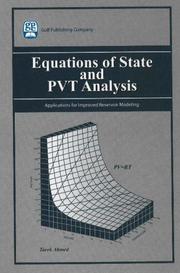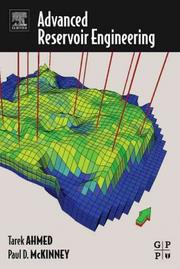| Listing 1 - 7 of 7 |
Sort by
|
Book
ISBN: 1282755587 9786612755583 0080966675 185617803X 9780080966670 9781856178037 Year: 2010 Publisher: Amsterdam Boston Gulf Professional Pub.
Abstract | Keywords | Export | Availability | Bookmark
 Loading...
Loading...Choose an application
- Reference Manager
- EndNote
- RefWorks (Direct export to RefWorks)
Reorganized for easy use, Reservoir Engineering Handbook, Fourth Edition provides an up-to-date reference to the tools, techniques, and science for predicting oil reservoir performance even in the most difficult fields. Topics covered in the handbook include: Processes to enhance productionWell modification to maximize oil and gas recoveryCompletion and evaluation of wells, well testing, and well surveys Reservoir Engineering Handbook, Fourth Edition provides solid information and insight for engineers and students alike on ma
Gas reservoirs. --- Oil fields. --- Oil reservoir engineering. --- Oil reservoir engineering --- Oil fields --- Gas reservoirs --- Mechanical Engineering --- Engineering & Applied Sciences --- Metallurgy & Mineralogy --- Gas pools --- Natural gas reservoirs --- Pools, Gas --- Reservoirs, Gas --- Oil lands --- Oil pools --- Petroleum fields --- Hydrocarbon reservoirs --- Natural gas --- Petroleum engineering --- Oilfields --- Mines and mineral resources --- Geology --- Engineering --- Civil Engineering
Book
ISBN: 012801752X 0128015705 9780128017524 9780128015704 9780128015704 Year: 2016 Publisher: Cambridge, MA
Abstract | Keywords | Export | Availability | Bookmark
 Loading...
Loading...Choose an application
- Reference Manager
- EndNote
- RefWorks (Direct export to RefWorks)
Understanding the properties of a reservoir’s fluids and creating a successful model based on lab data and calculation are required for every reservoir engineer in oil and gas today, and with reservoirs becoming more complex, engineers and managers are back to reinforcing the fundamentals. PVT (pressure-volume-temperature) reports are one way to achieve better parameters, and Equations of State and PVT Analysis, second edition, helps engineers to fine tune their reservoir problem-solving skills and achieve better modeling and maximum asset development. Designed for training sessions for new and existing engineers, Equations of State and PVT Analysis, second edition, will prepare reservoir engineers for complex hydrocarbon and natural gas systems with more sophisticated EOS models, correlations and examples from the hottest locations around the world such as the Gulf of Mexico, North Sea and China, and Q&A at the end of each chapter. Resources are maximized with this must-have reference. Improve with new material on practical applications, lab analysis, and real-world sampling from wells to gain better understanding of PVT properties for crude and natural gas; Sharpen your reservoir models with added content on how to tune EOS parameters accurately; Solve more unconventional problems with field examples on phase behavior characteristics of shale and heavy oil.
Reservoir oil pressure. --- Reservoir oil pressure --- Phase rule and equilibrium --- Petroleum --- Mathematical models. --- Underground storage. --- Underground storage --- Chemistry, Physical and theoretical --- Critical phenomena (Physics) --- Equilibrium --- Chemical equilibrium --- Chemical systems --- Critical point --- Formation pressure --- Pressure --- Storage
Book
ISBN: 1281052213 9786611052218 0080480683 0750679727 9780750679725 9780080480688 9781281052216 6611052216 Year: 2006 Publisher: Burlington, MA Elsevier/Gulf Professional
Abstract | Keywords | Export | Availability | Bookmark
 Loading...
Loading...Choose an application
- Reference Manager
- EndNote
- RefWorks (Direct export to RefWorks)
Reservoir Engineering, Third Edition provides solid information and insight for engineers and students alike on maximizing production from a field in order to obtain the best possible economic return. This guide contains information on predicting oil reservoir performance through the analysis of oil recovery mechanisms and performance calculations. It also contains valuable information on key relationships among the different operating variables. The examples contained within this reference demonstrate the performance of processes under forceful conditions through a wide variety of app
Oil reservoir engineering. --- Oil fields. --- Gas reservoirs. --- Gas pools --- Natural gas reservoirs --- Pools, Gas --- Reservoirs, Gas --- Hydrocarbon reservoirs --- Natural gas --- Oil lands --- Oil pools --- Oilfields --- Petroleum fields --- Mines and mineral resources --- Petroleum engineering --- Geology --- Engineering --- Civil Engineering

ISBN: 0127999787 1601195915 1933762039 9781601195913 9781933762036 9780127999784 Year: 2007 Publisher: Houston, Tex. Gulf Pub.
Abstract | Keywords | Export | Availability | Bookmark
 Loading...
Loading...Choose an application
- Reference Manager
- EndNote
- RefWorks (Direct export to RefWorks)
This title covers a wide range of topics related to the Pressure Volume Temperature (PVT) behavior of complexhydrocarbon systems and documents the ability of Equations of State (EOS) in modeling their behavior. Themain objective of this book is to provide the practicing engineer and engineering student with tools neededto solve problems that require a description of the PVT of hydrocarbon systems from their compositions.Because of the dramatic evolution in computational capabilities, petroleum engineers can now study suchphenomena as the development of miscibility during ga
Reservoir oil pressure --- Phase rule and equilibrium --- Petroleum --- Mathematical models. --- Underground storage. --- Underground storage --- Chemistry, Physical and theoretical --- Critical phenomena (Physics) --- Equilibrium --- Chemical equilibrium --- Chemical systems --- Critical point --- Formation pressure --- Pressure --- Storage --- Engineering --- Civil Engineering
Multi
ISBN: 9780128136508 0128136502 0128136499 9780128136492 Year: 2019 Publisher: Cambridge, MA Elsevier Ltd. :Gulf Professional Publishing
Abstract | Keywords | Export | Availability | Bookmark
 Loading...
Loading...Choose an application
- Reference Manager
- EndNote
- RefWorks (Direct export to RefWorks)
Reservoir Engineering Handbook, Fifth Edition, equips engineers and students with the knowledge they require to continue maximizing reservoir assets, especially as more reservoirs become complex, more multilayered, and unconventional in their extraction method. Building on the solid reputation of the previous edition, this new volume presents critical concepts, such as fluid flow, rock properties, water and gas coning, and relative permeability in a straightforward manner. Water influx calculations, lab tests of reservoir fluids, oil and gas performance calculations, and other essential tools of the trade are also introduced, reflecting on today's operations. New for this edition is an entire new chapter devoted to enhanced oil recovery techniques, including WAG. Critical new advances in areas such as well performance, waterflooding and an analysis of decline and type curves are also addressed, along with more information on the growing extraction from unconventional reservoirs. Practical and critical for new practicing reservoir engineers and petroleum engineering students, this book remains the authoritative handbook on modern reservoir engineering and its theory and practice.
Book
ISBN: 1283288184 9786613288189 0123855497 0123855489 9780123855480 Year: 2011 Publisher: Oxford Gulf Professional
Abstract | Keywords | Export | Availability | Bookmark
 Loading...
Loading...Choose an application
- Reference Manager
- EndNote
- RefWorks (Direct export to RefWorks)
Reservoir management is concerned with the geoscience and reservoir/production engineering required to plan and optimize the development of discovered or producing oil and gas assets. One of the only books to cover both management and engineering issues, Advanced Reservoir Management and Engineering is redesigned to be the only book you need throughout your career. Written by two of the industry's best-known and well respected reservoir engineers and managers, this new edition offers readers a complete guide for formulating workflow solutions on a day to day bases. Authoritative in
Oil reservoir engineering. --- Reservoirs --- Fluid mechanics. --- Management. --- Design and construction. --- Hydromechanics --- Continuum mechanics --- Artificial lakes --- Lakes, Artificial --- Lakes, Man-made --- Man-made lakes --- Tanks (Reservoirs) --- Bodies of water --- Hydraulic structures --- Petroleum engineering

ISBN: 0080498833 9786611036720 9780080598836 1281036722 1417544457 0750677333 9781417544455 1592782981 9781592782987 9780750677332 9780080498836 Year: 2005 Publisher: Burlington, MA Elsevier/Gulf Professional Pub.
Abstract | Keywords | Export | Availability | Bookmark
 Loading...
Loading...Choose an application
- Reference Manager
- EndNote
- RefWorks (Direct export to RefWorks)
Written by two of the industry's best-known and respected reservoir engineers, Advanced Reservoir Engineering offers the practicing engineer and engineering student a full description, with worked examples, of all of the kinds of reservoir engineering topics that the engineer will use in day-to-day activities. In an industry where there is often a lack of information, this timely volume gives a comprehensive account of the physics of reservoir engineering, a thorough knowledge of which is essential in the petroleum industry for the efficient recovery of hydrocarbons.
Oil reservoir engineering --- Gas engineering --- Fluid dynamics --- Mathematical models. --- Chemical engineering --- Mining engineering
| Listing 1 - 7 of 7 |
Sort by
|

 Search
Search Feedback
Feedback About UniCat
About UniCat  Help
Help News
News